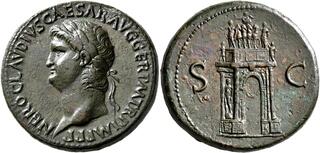| Leu Numismatik AG > Auction 15 | Auction date: 1 June 2024 |
| Lot number: 235 Price realized: This lot is for sale in an upcoming auction - Bid on this lot  | Show similar lots on CoinArchives Find similar lots in upcoming auctions on |
| Lot description: Nero, 54-68. Sestertius (Orichalcum, 35 mm, 26.78 g, 6 h), Rome, circa 64-65. NERO CLAVDIVS CAESAR AVG GER P M TR P IMP P P Laureate head of Nero to left. Rev. S - C Triumphal arch, showing the front, with a wreath hung across it, surmounted by the emperor in facing quadriga, accompanied by Pax and Victory and flanked by two soldiers; statue of Mars in side niche; the faces and plinths of the arch are ornamented with elaborate reliefs. BMC 188. CBN 292. Cohen 306. RIC 148. WCN 117. A lovely coin with an excellent portrait and a wonderful rendering of Nero's triumphal arch. Minor smoothing, otherwise, about extremely fine. From an old Swiss Collection started in the 19th century. Though few emperors took to the field personally once they were in power during the two first centuries of the Roman Empire, this did not prevent the construction of elaborate triumphal arches - a typically Roman architectural feature - as any victories gained by their generals automatically belonged to the principes. The present arch was constructed to celebrate Roman 'success' in the Roman-Parthian War of 58-63, which saw fighting erupt between the two empires over control of Armenia, after the Parthians had installed Tiridates I, brother of the Parthian King, Vologases I, as King of Armenia in 52. Despite early Roman successes under their highly capable general, Gnaeus Domitius Corbulo, which included the capture of Artaxata and Tigranokerta, a Parthian counteroffensive pushed Corbulo's colleague, Lucius Caesennius Paetus, into surrender, even while the Romans were erecting victory arches in Rome (Tac. Ann. 15.18). Corbulo managed to salvage the situation, however, and an accord was reached with the Parthians: Rome allowed the installation of an Arsacid ruler on the Armenian throne, but he required Rome's blessing. In practice, this arrangement would set the stage for continued conflict over the next 160 years, with control over Armenia as a major point of contention. Estimate: 5000 CHF |  |



